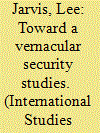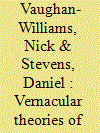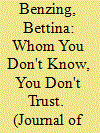|
|
|
Sort Order |
|
|
|
Items / Page
|
|
|
|
|
|
|
| Srl | Item |
| 1 |
ID:
151176


|
|
|
|
|
| Summary/Abstract |
The performance of International Relations (IR) scholarship – as in all scholarship – acts to close and police the boundaries of the discipline in ways that reflect power–knowledge relations. This has led to the development of two strands of work in ontological security studies in IR, which divide on questions of ontological choice and the nature of the deployment of the concept of dread. Neither strand is intellectually superior to the other and both are internally heterogeneous. That there are two strands, however, is the product of the performance of IR scholarship, and the two strands themselves perform distinct roles. One allows ontological security studies to engage with the ‘mainstream’ in IR; the other allows ‘international’ elements of ontological security to engage with the social sciences more generally. Ironically, both can be read as symptoms of the discipline’s issues with its own ontological (in)security. We reflect on these intellectual dynamics and their implications and prompt a new departure by connecting ontological security studies in IR with the emerging interdisciplinary fields of the ‘vernacular’ and ‘everyday’ via the mutual interest in biographical narratives of the self and the work that they do politically.
|
|
|
|
|
|
|
|
|
|
|
|
|
|
|
|
| 2 |
ID:
159216


|
|
|
|
|
| Summary/Abstract |
Discussions generated in Russian and Western academic, policy-making and media circles by recent terrorist attacks in the Middle Volga and Urals (İdel-Ural) derive primarily from hegemonic state discourses and as such miss the wealth of discussion generated in local-language sources about the causes and implications of these attacks. The goal of this study is to provide an examination of the various perspectives concerning terrorism in the region, focusing on the level of Tatar (and secondarily Russian) society. Employing insights from a recent body of literature on ‘everyday’ and ‘vernacular’ (in)securities as well as on conspiracy theories, I examine Tatar-language Internet forums posted on the Radio Free Europe website related to the terror events of July 2012. I detect no incitement to violence among the Tatar-speaking participants. However, my results suggest that Tatar publics use diverse interpretive repertoires to make sense of a securitizing reality. The study suggests that Tatar-speaking publics depart in important ways from the dominant narrative of the ‘police’ order as well as from the Weltanschauung of their Russian-speaking compatriots.
|
|
|
|
|
|
|
|
|
|
|
|
|
|
|
|
| 3 |
ID:
164454


|
|
|
|
|
| Summary/Abstract |
This article seeks to situate, evaluate, and advance the recent “turn” toward the “vernacular” within security studies. It argues that vernacular security studies has significant advantages over alternative “bottom up” approaches. First, its conceptual emptiness allows for genuinely inductive research into public experiences, understandings, anxieties, and fears. Second, it offers engagement with a potentially far richer tapestry of everyday (in)securities by refusing to prioritize particular populations by virtue of their identity or sociopolitical position. And, third, such an approach avoids the universalism inherent within related, yet more explicitly cosmopolitan, approaches to security. The article begins by situating vernacular security studies within relevant intellectual and (geo-)political dynamics from the late twentieth century. A second section distinguishes this approach from six alternative traditions with a similar emphasis on individual human referents: human security, critical security studies, postcolonialism, feminism, ontological security studies, and everyday security studies. The article then elaborates on the significance and added value of vernacular approaches to security, before outlining core conceptual, methodological, and ethical questions for future research.
|
|
|
|
|
|
|
|
|
|
|
|
|
|
|
|
| 4 |
ID:
161273


|
|
|
|
|
| Summary/Abstract |
Our primary aim in this article is to explore vernacular constructions of Europe’s so-called ‘migration crisis’ from the grounded everyday perspectives of EU citizens. We do so as a critical counterpoint to dominant elite scripts of the crisis, which are often reliant upon securitised representations of public opinion as being overwhelmingly hostile to migrants and refugees and straightforwardly in favour of tougher deterrent border security. In addition to broadening the range of issues analysed in vernacular security studies, the article seeks to make three principal contributions. Theoretically, we argue for an approach to the study of citizens’ views and experiences of migration and border security that is sensitive to the performative effects of research methods and the circular logic between securitising modes of knowledge production and policy justification. Methodologically, we outline and apply an alternative approach in response to these dynamics, drawing on the potential of critical focus groups and a desecuritising ethos. Empirically, we identify a vernacular theory of ‘the border’ as information management, and a significant information gap prevalent among participants with otherwise opposing views towards migration. These findings challenge bifurcated understandings of public opinion towards migration into Europe and point to the existence of vernacular border security imaginaries beyond either ‘closed’ or ‘open’ borders.
|
|
|
|
|
|
|
|
|
|
|
|
|
|
|
|
| 5 |
ID:
121858


|
|
|
|
|
| Publication |
2013.
|
| Summary/Abstract |
This article draws on primary focus group research to explore the differing ways in which UK publics conceptualise and discuss security. The article begins by situating our research within two relevant contemporary scholarly literatures: The first concerns efforts to centre the 'ordinary' human as security's referent; the second, constructivist explorations of security's discursive (re)production. A second section then introduces six distinct understandings of security that emerged in our empirical research. These organised the term around notions of survival, belonging, hospitality, equality, freedom and insecurity. The article concludes by exploring this heterogeneity and its significance for the study of security more broadly, outlining a number of potential future research avenues in this area.
|
|
|
|
|
|
|
|
|
|
|
|
|
|
|
|
| 6 |
ID:
143310


|
|
|
|
|
| Summary/Abstract |
Citizens increasingly occupy a central role in the policy rhetoric of British National Security Strategies, and yet the technocratic methods by which risks and threats are assessed and prioritized do not consider the views and experiences of diverse publics. Equally, security studies in both ‘traditional’ and ‘critical’ guises has privileged analysis of elites over the political subject of threat and (in)security. Contributing to the recent ‘vernacular’ and ‘everyday’ turns, this article draws on extensive critical focus-group research carried out in 2012 across six British cities in order to investigate (1) which issues citizens find threatening and how they know, construct and narrate ‘security threats’, and (2) the extent to which citizens are aware of, engage with and/or refuse government efforts to foster vigilance and suspicion in public spaces. Instead of making generalizations about what particular ‘types’ of citizens think, however, we develop a ‘disruptive’ approach inspired by the work of Jacques Rancière. While many of the views, anecdotes and stories reproduce the police order, in Rancière’s terms, it is also possible to identify political discourses that disrupt dominant understandings of threat and (in)security, repoliticize the grounds on which national security agendas are authorized, and reveal actually existing alternatives to cultures of suspicion and unease.
|
|
|
|
|
|
|
|
|
|
|
|
|
|
|
|
| 7 |
ID:
171802


|
|
|
|
|
| Summary/Abstract |
Arguments about the importance of vernacular security focus on its positive and inclusive potential for peacebuilding. Reflecting on the special constitutional and sociopolitical challenges post-conflict societies face in the aftermath of conflict, though, this article focuses on the way perceptions of security and security in the vernacular can exacerbate exclusionary effects in post-conflict societies. I discuss current approaches to security concepts dealing with social perceptions of (in)security and the linkages made in research between vernacular security and local peace. But I also highlight exclusionary structures in post-conflict settings, which are most often marked by distrustful social relations, as a byproduct of security measures. I argue, in contrast to current assumptions in research on security in the vernacular, that everyday measures not only have positive implications for peacebuilding but can also lead to social exclusion, fostering violence and hindering social equality, development, and peace.
|
|
|
|
|
|
|
|
|
|
|
|
|
|
|
|
|
|
|
|
|